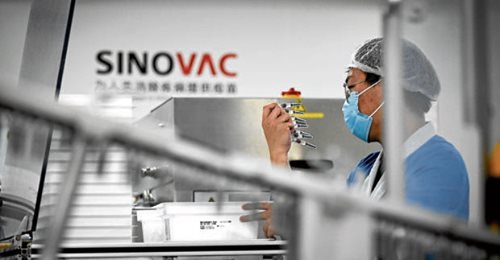MANILA, Philippines — Health workers who are not treating patients afflicted with Covid-19 can be inoculated with China’s Sinovac vaccine, according to the Food and Drug Administration (FDA).
FDA Director-General Eric Domingo issued this clarification through Sen. Sonny Angara, who was sponsoring the proposed Covid-19 Vaccination Program Act of 2021 during Monday’s Senate session.
The FDA recently approved the emergency use authorization (EUA) of the vaccine developed by Sinovac Biotech, the third vaccine maker to receive such an authorization in the Philippines.
Domingo earlier explained that the efficacy rate of the Sinovac vaccine on health care workers stood at 50.4%, making it not the best vaccine to be given to medical frontliners exposed to Covid-19 patients.
“The FDA director is now further clarifying or qualifying his remarks saying that it is not recommended for health workers treating Covid-19 cases,” Angara said upon conferring with Domingo.
“So for other frontliners, other health care workers, those who are not treating Covid-19 cases, he says the Sinovac vaccine is OK,” the senator added.
Domingo estimates that there are more or less 20,000 health care workers treating Covid-19 patients nationwide, according to Angara.
Angara also mentioned that Domingo informed him that the efficacy rate of Sinovac vaccine was at 91% for “non-health frontliners.”
Before this, several senators inquired about the FDA’s earlier advice against using the Sinovac vaccine for health care workers.
Sen. Francis Pangilinan said it was “quite problematic” and that the EUA granted to Sinovac seemed like a “half-hearted, half-baked endorsement.”
“How will our citizens — those who are not frontliners — how will they feel if they are assigned the Sinovac dose rather than the doses which have no negative recommendations?” Pangilinan asked.
He raised concerns over the possibility of health care workers being left out of the priority list of vaccine recipients should vaccines that could be administered to them “come later rather than earlier while the vaccine that can be for the rest of the population can be made available.”
“Therefore, the fronliners would have to wait while the other sectors are being vaccinated. But that’s hypothetical, we do hope they all come and so that our frontliners will get the recommended rather than the Sinovac vaccine,” he added.
Aside from Sinovac, the FDA approved the emergency use of the vaccine developed by Pfizer and AstraZeneca, which the Philippines is expected to receive through the World Health Organization-led Covax facility in the first quarter of the year.
The arrival of the initial batch of vaccine doses from Covax — consisting of 117,000 doses from Pfizer — has been delayed due to the need to finalize indemnification documents.
Viral load
Continuing with the discussion about the FDA’s earlier remarks, Angara used the analogy earlier used by Sen. Panfilo Lacson in describing FDA’s advice against the Sinovac’s vaccine on health workers.
“For lack of a better analogy, it’s like a chef who refuses to eat the food that he cooked and which his restaurant-employer serves to the customers,” Lacson said in an earlier statement.
During the plenary session, Angara said: “To use the analogy of Senator Lacson about the chef, I think the chef is just telling us that this dish is spicy, that other dish may contain nuts so it is not recommended to those who may have an adverse reaction to nuts. He’s not telling us not to take it.”
Angara explained that the FDA chief was “just telling us what the science is telling him.”
“And the science is telling him that for certain groups, it may not be suited. Whereas it may be suited for other groups, in the same way other food may not be suited for other people,” the senator added.
Sen. Juan Miguel Zubiri also joined in on the discussion and surmised that the reason for the FDA earlier saying that the Sinovac vaccine is not recommended for medical workers is because the efficacy rate of the brand was a “bit lower” compared to others.
Zubiri said that, since health care workers were exposed to Covid-19, they would need a “higher efficacy rate of a vaccine to keep them protected.”
“With the frontline workers that are always exposed to Covid patients, the viral load is higher…If it’s just the normal population, the efficacy rate is good enough for them not to get a severe case of Covid sickness,” he said.
“But for the doctors, they must be given added protection…It’s due to the viral load, they’re always exposed to Covid-19 virus so they need a vaccine with a higher efficacy rate that can really protect them because of their exposure,” he explained.


